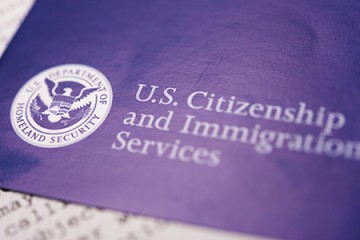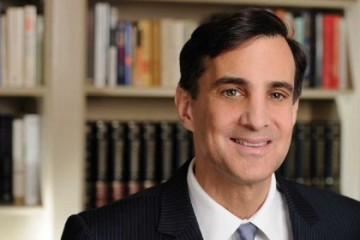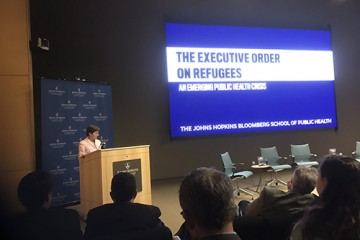Two events are seared into the mind of Anne Richard, a former assistant U.S. secretary of state for population, refugees, and migration who served under Barack Obama.
Video credit: SAIS events
The first is the day the body of Aylan Kurdi, a 3-year-old Syrian boy, washed up on a Turkish beach. The toddler had been fleeing with his family to Greece when the boat carrying them capsized. His mother and 5-year-old brother were also among the dead.
That was the day, Richard said, the world woke up to the massive migrations taking place from the Middle East to Europe.
The other date burned into her mind is Nov. 13, 2015—the night of the Paris Attacks. Orchestrated by European-born jihadists and individuals who may have entered Europe disguised as refugees, she said that the attack signaled a change in thinking about refugees.
"There was this instantaneous conclusion that refugees were on the march," she said, "and were therefore a threat."
Richard delivered her remarks as part of the panel discussion "New Challenges for the Refugee Regime" at the Johns Hopkins University School of Advanced International Studies earlier this week. Experts examined the consequences of the executive order signed last month by President Donald Trump limiting the entry of immigrants from seven Muslim majority countries, suspending the U.S. refugee program, and barring Syrian refugees indefinitely.
The panel took place Tuesday—just an hour and a half before the Ninth Circuit Court of Appeals heard opening arguments over a temporary restraining order halting the enforcement of the ban.
Michel Gabaudan, president of Refugees International, said that the ban risks conflating victims of violence with perpetrators by associating refugees with terrorists. He also reminded the audience that the vetting process for refugee resettlement within the U.S. is different from in Europe. Refugees who enter the U.S. are vetted before arrival; those who are resettled in Europe are vetted after they arrive.
Maureen White, a senior fellow at the SAIS Foreign Policy Institute who moderated the event, pointed out that vetting for refugees is a thorough process. It currently involves eight federal agencies, six security databases, five background checks, four biometrics security checks, three separate in-person interviews and two interagency security checks.
Also see
Ruth Wedgwood, a professor of international law and diplomacy at SAIS, discussed how the St. Louis, a boat carrying Jewish refugees during WWII, had been denied entry and sent back to Europe, where many of those on board were killed.
She argued against the flawed notion that "if the US does not welcome refugees someone else will," saying, "the U.S.'s own conceit about being the indispensable nation is true."
She recalled a court filing recently written by diplomatic and security officials calling the executive order "ill-conceived, poorly implemented, and ill-explained."
Wedgwood went on: "I would say, to add to their list, inhumane."
Posted in Voices+Opinion, Politics+Society
Tagged immigration, refugee crisis











